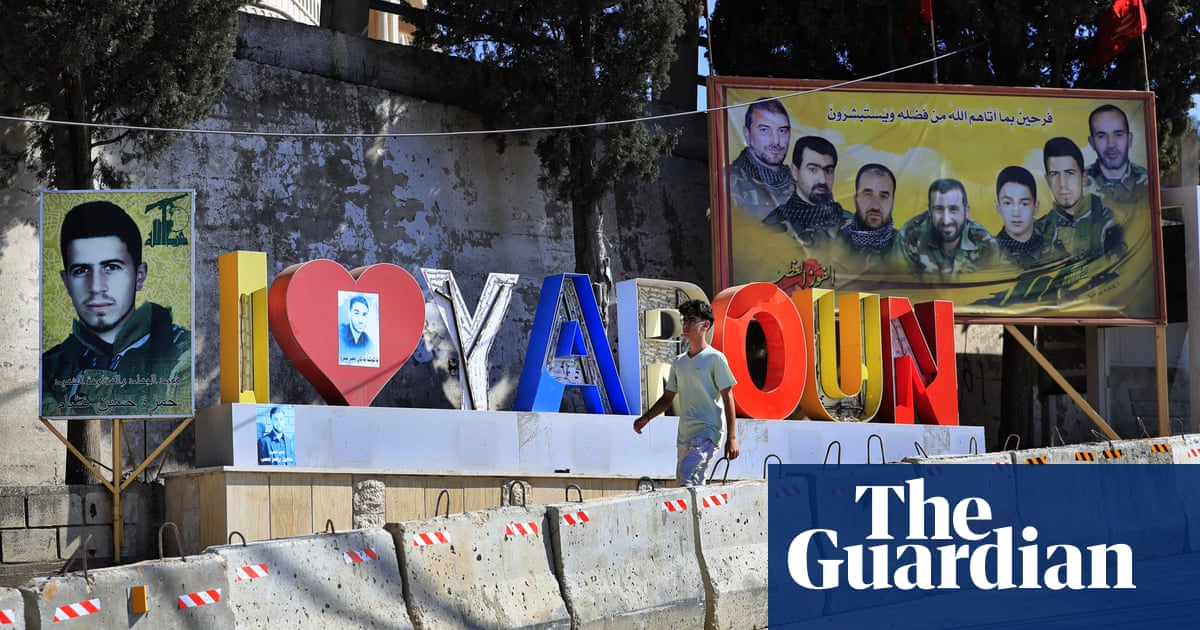
The home town of the father of Salman Rushdie’s would-be assassin is a forbidding place, where Shia Islamic iconography sits among palatial mansions, bullet-pockmarked homes and wary locals, who for now want nothing to do with visitors.
Yaroun, on Lebanon’s border with Israel, has long been a centre of Iran’s four-decade-old conflict with Israel. Its ridges and valleys have been key to several wars, and photos of its martyrs line most streets, along with the ever-present yellow banners of its most powerful player, Hezbollah.
Hadi Matar’s father and extended family live here, amid staunchly conservative, affluent neighbourhoods. Newly built palaces tower from hilltops. Streets are swept clean and road workers are busy doing maintenance work, a rarity in a country in economic freefall. But Yaroun clearly looks after its own.
And so it did when the Guardian visited the mayor’s office in the centre of town, looking for directions to Matar’s family. “I’m not going to talk about this subject,” the mayor responded curtly. “Nobody else here will talk to you about it and I advise you to leave now.”
A cleric in a white headdress was equally standoffish, though more polite. “What is your name and why are you here?” he asked. “Go ask near the hair salon.”
Murals in the town of Yaroun. Photograph: Aziz Taher/Reuters
Matar, who was born in the US, is believed to have spent several summers in Yaroun, from his late teens onwards. His allegiance has been the subject of speculation, both in Lebanon and in New York, where he has been charged with Rushdie’s attempted murder. But his driver’s licence offers some clues. He used a false first name and surname on his official document, Hassan Mughniyah, a confluence of Hezbollah’s leader and its most storied commander.
Whether Hezbollah or Iran played a role in directing Matar to allegedly stab the writer, or whether he felt empowered to do so by the 33-year-old fatwa, is the subject of contention across the region. Iranian state media on Monday disavowed any direct link but claimed Rushdie had deserved to be assaulted because of his book The Satanic Verses, in which some say he described the prophet Muhammad in blasphemous terms.
Hezbollah-linked media have also pulled no punches, describing the attack variously as a “strike in the neck” of the author, or “God’s revenge”.
But on a stifling midsummer afternoon, nothing moved in Yaroun, and few people took to the streets. Those who did kept their heads down, walking solemnly past murals that pay homage to the Hezbollah leader, Hassan Nasrallah, and Iran’s two most recent supreme leaders, Ruhollah Khomeini, who issued the fatwa against Rushdie, and Ali Khamenei, who endorsed it.
The slain Iranian general Qassem Suleimani also features prominently, as does the Hezbollah military commander Imad Mughniyeh, who was killed by the CIA and Mossad in Damascus 14 years ago.
All five men have been at the flight deck of the Iranian Revolutionary Guards’ efforts in southern Lebanon and around the region. Their murals’ prominent presence in the centre of town spoke to their significance among a population that wanted little to do with the aftermath of the Rushdie attack.
“The mother [of Hadi] told me she wanted not to talk with the media and asked me to keep them away,” said an assistant to the mayor before the Guardian’s visit to Yaroun on Monday.








